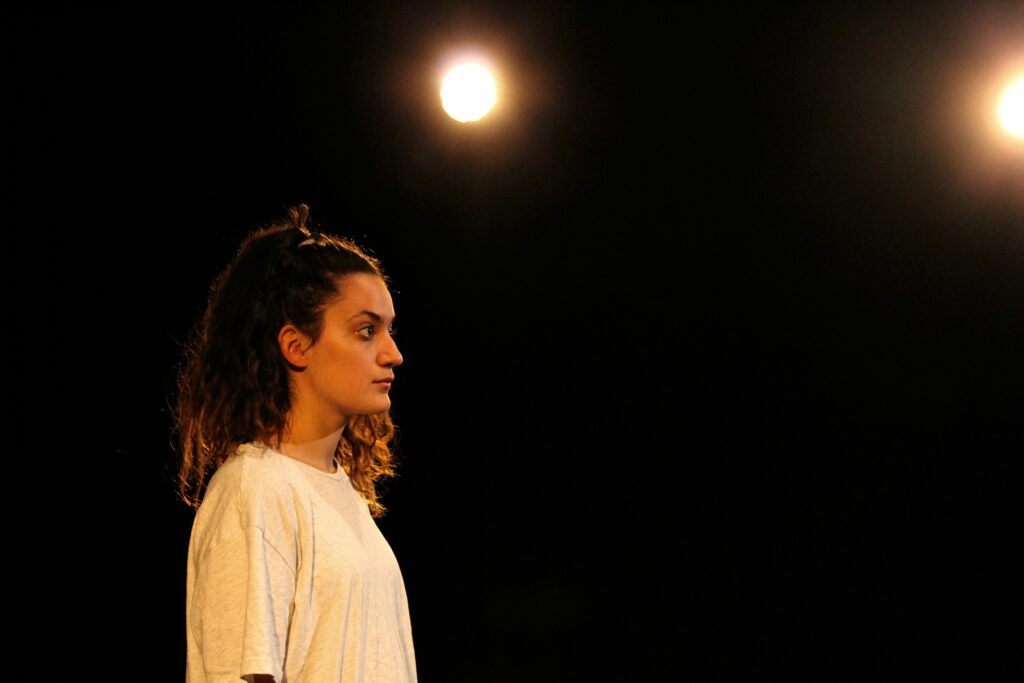Today we have the pleasure of talking to Isabelle Kabban, writer and performer of Love (Watching Madness). Her show tackles the complexities of loving someone with a mental illness and is billed as, ‘ A moving, funny and relatable insight into how it feels to care for someone who can’t always show that they care for you.’
Can you introduce yourself and your show?
I’m Isabelle, I’m the writer and performer of LOVE (Watching Madness). I’m also the artistic director of SpeakUp Theatre.
What is the top reason people should see the show?
It’s about the absolute strength and love of two women at different points in their lives. Whether you love someone with mental illness or not it’s an incredibly important story that every single person can relate to.
What does a ‘successful Fringe run’ mean to you?
It would mean opening up conversations, meeting and connecting with other emerging companies, seeing shows that are exciting hidden gems and eating a deep fried Mars bar every single day. Selling out shows would be the dream too!
What 3 top tips have you got for Edinburgh Fringe first timers?
– You can never take too much Berocca!
– Go to Mosque Kitchen every day. Affordable curries can get you through anything.
– See as much as you possibly can and don’t be afraid to go for something different. Edinburgh Fringe is the one time of year where you can see a life changing show at 10am so appreciate it and relish the weirdness of it all. Make friends with strangers in queues and get their recommendations.
Your production is a one-woman show investigating the complexities of loving someone with mental illness, specifically a bipolar disorder. For audience members who are unaware of the condition, how does it impact someone, and the ones they love?
Bipolar is a mood disorder where typically someone’s moods can go from intense highs to very dark lows. These can last months or just a matter of hours depending on the person. What people don’t often talk about is that in between these states there are a lot of other symptoms that can have a huge effect on the sufferer. They might get intense irritation, hallucinations or might get fixated on certain ideas. Everyone’s experience is really individual and that is key.
Like any illness it’s really hard watching someone you love go through it. I think the hardest part is the fact that it will always be there. That person may have months or sometimes years of feeling better and living a more ‘normal’ life (whatever that means), but it always seems to crop up again. For me, personally, it’s meant that I live a lot of my life feeling quite anxious, worrying about my mum and how she might be feeling. Despite this, it’s really important to remember that even if it’s hard for a family member or loved one it will always be a million times harder for the sufferer because they are battling with their own brain every single day.
What key message do you hope comes across to your audiences?
In the end there is only room for love.
Are there specific challenges of performing on your own on stage, particularly a highly emotive show such as Love (Watching Madness)?
As an actor it’s such an amazing challenge being on stage alone. It almost forces you to push even further for that connection with the audience because they’re all you’ve got.
I do really struggle with nerves. Five minutes before the house opens I’m always like “Izzy why didn’t you choose a more normal and less scary career for yourself?” But my amazing director Ruth Anna Phillips has prepped me so well. She has created a really specific pre-show routine for us to do which gets me super focused and helps me to feel more comfortable in the space and able to use my nerves in a constructive way. We’re also best friends so we trust each other a lot which helps.
It is very tiring but, to be honest, I just feel so lucky every time I’m able to perform the show – having paying audience members willing to spend an hour of their time watching you is amazing. I wish I could do it every day.
We understand your theatre company is passionate about outreach and that you have run workshops to accompany performances. How was that experience and how did people with mental health challenges respond to your play?
Ruth and I ran a workshop for a company called the 888 Collective who help people with mental health issues get back into employment. It was honestly one of the most fulfilling experiences of my life. It was so incredible to give these people an opportunity to let go, have fun and channel their experiences into something creative. Ruth is a movement director so specialises in connecting people with their bodies. We spend so much of our life completely disconnected from ourselves we have forgotten how to play, so her giving people the opportunity to do that was amazing.
Audience members have been incredibly moved by the piece. I think it has really spoken to a lot of people because it’s put their own experiences on stage in front of them. That, for me, is what theatre is about so it’s really special.
How are you promoting your show in the run up to the Fringe?
Social media! Follow us on Twitter @SpeakUpCogs or on Instagram @speakupstandup
Lastly do you want to tell us where and when we can see the show?
Bunker Three at Pleasance Courtyard from 31st July – 26th August. The show is on every day (except 18th August) at 11.35am.
Love (Watching Madness) will be performed daily at the Pleasance Courtyard at 11:35 from August 1st-17th and from August 19th-26th. There will be a preview show on July 31st. Tickets available from the Fringe Box Office.

